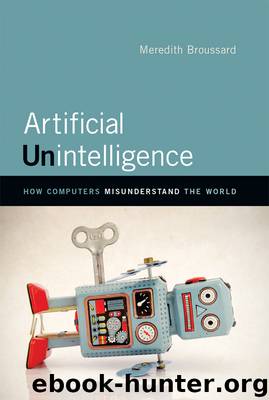Artificial Unintelligence by Broussard Meredith;

Author:Broussard, Meredith;
Language: eng
Format: epub
Tags: AI; computers; machine learning; data journalism; standardized tests; technology; tech; programming; algorithm; self-driving cars; 2016 presidential election
Publisher: MIT Press
Published: 2018-05-25T04:00:00+00:00
Data is unreasonably effective—seductively so, even. This explains why we can build a classifier that seems to predict with 97 percent accuracy whether a passenger survives the Titanic disaster and why a computer can defeat a human Go champion. It also explains why, when we look closely at what happens during the machine-learning process, the machine doesn’t take into account any of the flukes that humans know happen in real-life disaster situations. Data is very effective. However, the data-driven approach ignores a number of factors that humans think matter a great deal.
Law and society are set up to accommodate all of the things that humans think matter. Data-driven decisions rarely fit with these complex sets of rules. The same unreasonable effectiveness of data appears in translation, voice-controlled smart home gadgets, and handwriting recognition. Words and word combinations are not understood by machines the way that humans understand them. Instead, statistical methods for speech recognition and machine translation rely on vast databases full of short word sequences, or n-grams, and probabilities. Google has been working on these problems for decades and has the best scientific minds on these topics, and they have more data than anyone has ever before assembled. The Google Books corpus, the New York Times corpus, the corpus of everything everyone has ever searched for using Google: it turns out that when you load all of this in and assemble a massive database of how often words occur near each other, it’s unreasonably effective. Let’s take something simple. In n-grams, the word boat usually occurs near water, so the two are probably related. The probability is higher that boat is closer to water than to electorate or stink bug, so a search pulls up terms or documents related to boats and water rather than to boats and stink bugs. People generally talk about the same types of things and search for the same types of things, and common knowledge is really quite common. The machine is not really learning; the search process is just inspired by human learning. If you read the math, which is all posted online, it’s very clear that these calculations are not magic and are just math. The computer will get enough things right enough of the time that we may be tempted to call it mostly correct—but it will get things right for exactly the wrong reasons.
Because social decisions are about more than just calculations, problems will always ensue if we use data alone to make decisions that involve social and value judgments. Traveling first class on the Titanic meant someone was more likely to survive—but it would be wrong to deploy a model that suggests first-class travelers deserve to survive disasters more than people who travel second or third class. Nor should we do other things that derive from a flawed model like the one we created. Our Titanic model could be used to justify charging first-class passengers less for travel insurance, but that’s absurd: we shouldn’t penalize people for not being rich enough to travel first class.
Download
This site does not store any files on its server. We only index and link to content provided by other sites. Please contact the content providers to delete copyright contents if any and email us, we'll remove relevant links or contents immediately.
| Anthropology | Archaeology |
| Philosophy | Politics & Government |
| Social Sciences | Sociology |
| Women's Studies |
Cecilia; Or, Memoirs of an Heiress — Volume 1 by Fanny Burney(32558)
The Great Music City by Andrea Baker(32018)
Cecilia; Or, Memoirs of an Heiress — Volume 2 by Fanny Burney(31956)
Cecilia; Or, Memoirs of an Heiress — Volume 3 by Fanny Burney(31941)
We're Going to Need More Wine by Gabrielle Union(19045)
All the Missing Girls by Megan Miranda(16023)
Pimp by Iceberg Slim(14506)
For the Love of Europe by Rick Steves(14121)
Bombshells: Glamour Girls of a Lifetime by Sullivan Steve(14073)
Talking to Strangers by Malcolm Gladwell(13370)
Norse Mythology by Gaiman Neil(13363)
Fifty Shades Freed by E L James(13239)
Mindhunter: Inside the FBI's Elite Serial Crime Unit by John E. Douglas & Mark Olshaker(9339)
Crazy Rich Asians by Kevin Kwan(9290)
The Lost Art of Listening by Michael P. Nichols(7506)
Enlightenment Now: The Case for Reason, Science, Humanism, and Progress by Steven Pinker(7311)
The Four Agreements by Don Miguel Ruiz(6763)
Bad Blood by John Carreyrou(6621)
Weapons of Math Destruction by Cathy O'Neil(6279)
